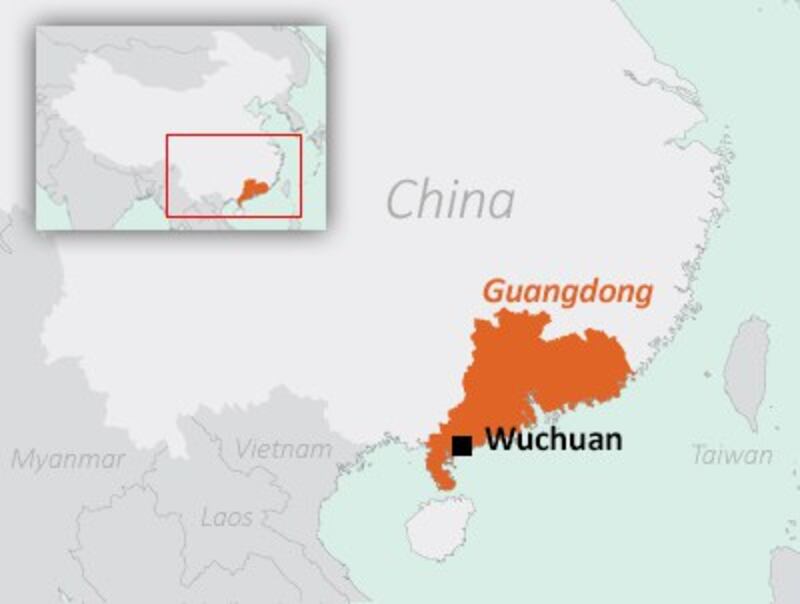Authorities in southern China are increasingly worried about a growing number of secret, mutual assistance societies that have sprung up in recent years to address growing social inequalities, official media reports say.
Southern and eastern China is the traditional home of secret societies, known in Western popular culture as "triads."
But many groups now regarded as criminal or shady were initially set up as mutual help groups in times of oppression, or as informal banking and commercial networks that overseas Chinese from the same hometown could draw upon in time of need.
In the southern province of Guangdong today history appears to be repeating itself, with organizations with names like the "Youth Group," "The Brothers," and "The Sisters" growing increasingly powerful in recent years, the Southern Rural News reported on Sunday.
Such groups get together to honor births, weddings, and funerals, or when one of their members falls on hard times, the paper quoted a member of a secret society based near Guangdong's Wuchuan city as saying.
"The brothers with money help out the others, and everyone helps everyone else out," the society member, "A Keung," was quoted as saying.
The paper said such societies often boast high-ranking and powerful members, including ruling Chinese Communist Party officials, entrepreneurs and school principals.
The growing popularity of these groups has made them a target for the authorities, sparking periodic crackdowns.
In Wuchuan city, the government has banned a total of 56 "youth groups," and signed agreements with local governments to continue to disband such groups without the need for further orders from higher up, the paper said.

'No basis for ban'
Beijing-based rights lawyer Li Fangping said the government is making a mistake, however.
"These are nonpolitical groups, and they have the right to free association," Li said. "Such groups wouldn't be restricted in any country with constitutional government."
He said the grounds for disbanding such societies hasn't been explained, nor has the process for disbanding them been clearly delineated.
"We haven't seen any kind of information about this; nor is there any kind of basis for [banning them] in law," Li said.
"Societies of brothers are civil, mutual-help societies, and show the vitality of social activism at a local level," scholar Jia Xijin wrote in an opinion piece in the Beijing News on Monday.
"The government should deal carefully with them, not tar them all with the brush of the triad societies," Jia said.
Government protection
Meanwhile, Shenzhen-based writer and democracy activist Zhu Jianguo said that such groups exist because of a distortion in social relationships already caused by China's Communist Party.
"These organizations have already emerged, but this didn't take place against a backdrop of a normal [society]," Zhu said.
"These civil groups are emerging at a time when the Party is corrupt to the core, and does nothing to alleviate the suffering of ordinary people. Instead, it detains those who complain, and the urban management officials trample the heads of street-hawkers," he said.
"These groups mean far more [to their members] than a normal civil society group; they are about protecting oneself against the government."
The phenomenon isn't just confined to Guangdong or to rural areas, reports said.
In recent years, police have harassed and detained members of flash mob meetings set up by pro-democracy activists in a number of Chinese cities.
'A burning fuse'
Some analysts say it is the Party's own history with secret societies, which relied heavily on their support in the early days of the revolution, that gives China's leadership nightmares.
"There are a lot of societies around which aren't very big, [because] they're secret and underground," Zhu said.
"They don't really know how many of them there are, which really frightens them."
According to Twitter user @dengerhuanghuang: "From the point of view of the Chinese Communist Party, which relied heavily on underground organizations when it was starting up, any sort of grouping of citizens in any locality is a burning fuse which must be immediately extinguished."
For this reason, such societies are unlikely to get a chance to register as legal entities and seek government recognition, Zhu said.
He said political reforms are the only way to defuse the growing social tensions that create such societies in the first place.
"Every authoritarian dynasty tries to abolish civil societies, but the processing of disbanding them just gives rise to greater and more extreme social tensions," Zhu said.
Reported by Xin Lin for RFA's Mandarin Service. Translated and written in English by Luisetta Mudie.
